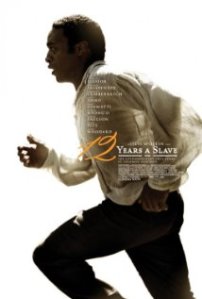If 12 Years a Slave weren’t based on a true story I would find it hard to believe that the events depicted had not been exaggerated for the sake of melodrama. I found it so brutal, so shocking and so uncomfortable that it would have been preferable to believe that it had been embellished. But this is based on the 1853 memoir of Solomon Northup, a free man living in New York in 1841 who is kidnapped and sold into slavery in Louisiana where he endures for 12 years before finally managing to secure his release.
This is pre-Civil War, pre-abolition America and director Steve McQueen’s portrait of slavery is a million miles away from the romantic Gone with the Wind depiction of avuncular plantation owners, kind mistresses and contented slaves. It’s relentless in its portrayal of the casual cruelty and violence experienced by Solomon and his fellow slaves – I’ve heard it criticized for being gratuitous and unnecessary but apparently the book on which it’s based contains far worse atrocities.
While there’s little let-up in the misery there are unexpected moments of kindness and beauty. The cinematography is sublime washing the landscapes with a peachy glow – sunrise over a Southern swamp, glassy water, flowing Spanish moss and overhanging trees – I found these scenes so evocative that they completely drew me into Solomon’s world. McQueen is not afraid to let the camera linger and often leaves the horror on the screen to be absorbed in total silence (I’m thinking of one scene in particular, part-way through the movie that’s almost impossible to watch for that reason, like trying not to look at a car crash). And because the score (by Hans Zimmer) is so sparing, the space only enhances the power of what is being witnessed.
The cast is uniformly superb but the following performances stood out for me: Lupita Nyong’o as the young slave-girl Patsey who steadily has her spirit broken through relentless abuse; Paul Dano (condemned I fear to a career playing greasy and spineless losers) as racist overseer’s mate John Tibeats; Michael Fassbender chillingly disturbing as the monstrous and sadistic plantation owner Epps and Sarah Paulson as his vicious, jealous wife (hard to decide who’s more repellant). And, of course, Chiwetel Ejiofor, who is mesmerizing as Solomon – his face so expressive that there’s often no need for him to speak. The only vaguely weak link was Brad Pitt, his character is arguably the most pivotal but I found him the least convincing.
At the risk of joining the hyperbolic chorus I found watching this movie a profound experience – I truly don’t think I’ve seen anything quite like it. It’s an exquisitely made film; beautifully shot, brilliantly acted, horrifying and compelling in equal measure.

